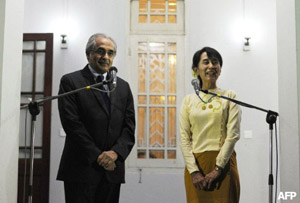One year after the new Burmese government formed the country has reached “an unprecedented level of initiative, as recognized by a range of stakeholders across the political spectrum,” says the U.N. special adviser to the secretary-general.

Vijay Nambiar, ending his four-day visit to Burma, said sweeping changes had raised the level of expectation for Burma’s chairmanship of Asean in 2014.
During his meetings with government officials Nambiar stressed three priorities that he believes will define domestic and international perceptions of the pace of reforms.
“It is necessary to ensure that both the process leading to, and the conduct of, the by-elections on April 1 are credible, and that they are seen to be so by all,” he said in a statement released on Friday.
Another marker, he said, is peace and national reconciliation with ethnic groups and the democratic opposition.
“Progress is now needed with regard to the situation in Kachin State, including the needs of the displaced population. Overcoming decades of strife and mistrust through inclusive political dialogue remains an important prerequisite to building a durable peace, which the country requires in order to move forward as one,” he said.
Health, education and job creation remain key responsibilities for both central and local authorities in order to empower,” he said, which can come about only through the implementation of sound economic policies in the interests of all people.
“It is self-evident that neither peace nor development can be sustained without respect for human rights and the rule of law,” he said. “Building on the recent release of political prisoners and other measures, further steps are necessary in order to build trust and enable the democratic transition to succeed.”
The special adviser said now is the time for the government and the international community to step up support and to adjust existing policies “to help build conditions for sustaining the reform and for the betterment of Myanmar’s peoples.”


